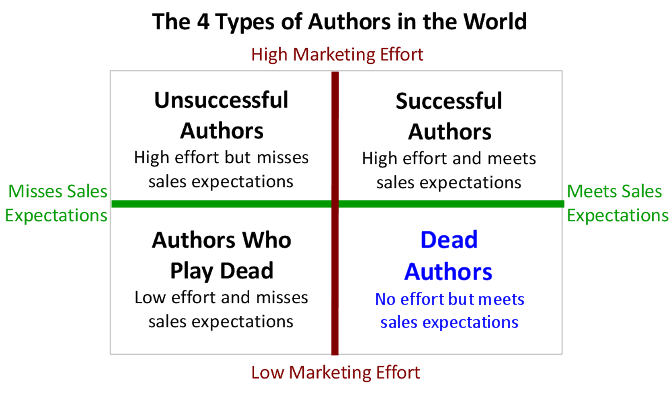My previous post explained how there are only four types of authors in the world, and we looked at the issues that plague the Unsuccessful Author category. This post focuses on the category that many people forget exists, Dead Authors. This unique group shows how success isn’t just limited to the land of the living.
Dead authors are writers who are, well, dead. They no longer write books and don’t do any marketing. They can’t conduct media interviews, schedule booksignings, or post on Facebook. They are departed. Yet, their books keep selling at levels near to or greater than when they were alive. Their books can range from small niche titles to classic backlist books that withstand the test of time and have an evergreen audience. Examples include C.S. Lewis, Jane Austen, J.R.R. Tolkien, Steig Larsson, Agatha Christie, Mark Twain, and heaven’s all-time bestseller, the Bible.
Dead authors may not be able to exert market effort from the grave. However, they can command a sense of fascination, goodwill, and word of mouth among readers that living authors would die to possess. Publishers can build upon this interest to stimulate sales and attract a wider audience.
Most readers don’t care that an author is deceased, because their focus is on what the author wrote. They want to stay connected to the content and continue reading their work. Every publishing house has a group of books by dead authors with plenty of life left in them. They’re too important to disregard, because a built-in audience remains for their material. If ignored, the audience will die off as well. That’s too much death for a publishing house to handle.
Publishers can cultivate, and even resurrect, backlist books with a promotional strategy I like to call “Dead Author Marketing,” which uses the following methods to keep sales humming along as if the author was still alive today:
1. Connect with online and offline communities
People naturally congregate around all types of topics, including dead authors and their books. You can find fan clubs, dedicated Facebook pages, reenactment groups, chat rooms, online forums, etc. For example, I challenged one of my consulting clients to see how many groups existed that were dedicated to Jane Austen and her books. In less than a week, they located over 100 communities that included historical societies, social media groups, book clubs, websites, etc. When you find people gathered around a common issue, such as a dead author, you can market to them by offering value that meets their interests.
2. Link to modern media headlines
Just because an author is dead doesn’t mean their books are irrelevant. In many cases, their content offers lessons, examples, or insights that are applicable to today’s top stories. In addition, the media industry commonly celebrates notable anniversaries, historical events, and birthdays. This type of media attention offers the perfect opportunity to resurrect interest in a dead author’s books.
3. Value-based Advertising
When readers consider buying a book, they don’t ask themselves, “Is the author dead or alive?” Instead, they ask themselves, “What’s in it for me?” If the content is perceived as beneficial or entertaining, then the age of the content is insignificant. In fact, some readers respect books more when they stand the test of time. Like vintage jewelry and fine wine, some consumers attach more value to books as they age. This mentality offers publishers unique advertising options that capitalize on a reader’s sense of trust, loyalty, and sentimentality. The value of a dead author’s content can be promoted as rare and worthy of respect. For example, think Lord of the Rings or Sense and Sensibility.
4. Create word of mouth tools
Word of mouth is spread by living readers, not living authors. When you give readers something worth talking about, they’ll take the ball and run with it. This allows publishers to continually fuel interest in a dead author’s books without much labor-intensity or cost. There are numerous tools that can drive awareness and spur sales, such as contests, quizzes, samples, giveaways, pithy quotes, etc. One of the best word of mouth tools to promote dead authors is to unlock their “vault” of archived material. Publicize peculiar items, such as lost chapters, research notes, old photos, family letters, historical records, etc. An author may die, but the word of mouth can last forever.
When a core audience exists for a book, the publisher doesn’t always need the author’s involvement to grow book sales. Let the dead rest in peace, and harness the excitement of the living to draw more readers to the party.
In my next post, we’ll conclude by analyzing the Authors Who Play Dead category. These authors are like sluggish, unpleasant zombies who walk around bemoaning their fate. If a publisher lets too many of these authors into their business, they can get eaten alive.
